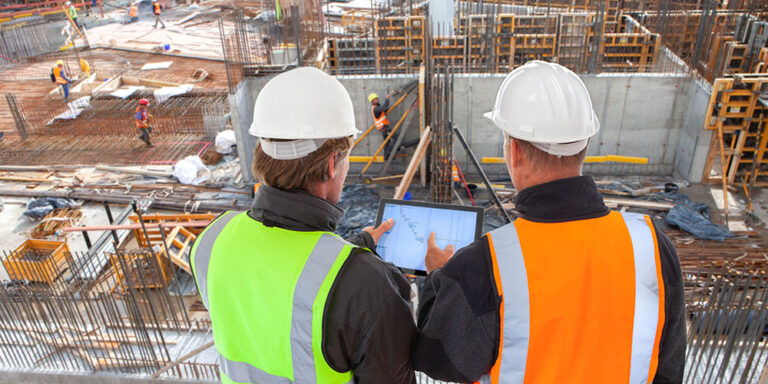— 7 min read
Visibility Through Technology: The Route to Profits for UK and Ireland Construction Businesses

Last Updated Aug 28, 2025

Tom Noctor
Senior Product Manager, International
16 articles
Having worked in construction for many years both on the ground as an electrician and in the design space in roles such as BIM Manager, I witnessed the highly inefficient operations of our industry and also the amount of waste generated from project delivery. I am a Digital Construction Technologies advocate @Procore Technologies, supporting and guiding the construction industry in adopting/utilising technology to deliver projects in a lean sustainable manner.

Nicholas Dunbar
Content Manager
65 articles
Nick Dunbar oversees the creation and management of UK and Ireland educational content at Procore. Previously, he worked as a sustainability writer at the Building Research Establishment and served as a sustainability consultant within the built environment sector. Nick holds degrees in industrial sustainability and environmental sciences and lives in Camden, London.
Last Updated Aug 28, 2025

How can a construction business become more profitable? The quick answer is down to how clearly you can see what is going on in the business at multiple levels. If you have good visibility, you can deploy resources better, leading to more efficient operations and more cash available to invest in growth and change.
True, visibility won’t fill the coffers alone — there are longstanding risks that must be managed, and operational and cultural behaviours that, if adopted, will lead firms towards greater profit. But the ability to see risks, opportunities and trends early, and to respond to them, is what marks the difference between a construction business that is merely surviving and one that’s thriving. Being habitually proactive is what sets a business apart — and this is only possible when you have a clear view of both the bigger picture and the finer details.
Table of contents
Profit Fundamentals
There are certain areas or operations that cannot be overlooked if a construction business is to be profitable. In today’s environment, having a user-friendly construction management system or platform is chief among them. This is the platform through which a construction firm will run, monitor, share and communicate what is going on in the business. This includes on site, off site, in terms of costs, safety, labour, risks — everything. This kind of system is so important because it supports success and alignment in other key areas.
Accurate Estimation
For example, accurate project cost estimation before construction begins is essential. Getting this wrong can wreak havoc with profitability. If you agree on the project's price, but your costs shoot up, you’ll have to deal with a lower profit margin. The more accurate your estimates, the more likely you are to achieve your profit goals. Construction management software streamlines the estimation process by using historical data to predict future costs, reducing guesswork and enabling more accurate budgets for better profitability.
Cost Control
From there, your ability to control costs will be decisive once procurement and construction are underway. Construction management platforms enable profit-focused businesses to build customised reporting dashboards and track real-time spending, build project budgets, track actual costs against projected figures and set automated alerts to flag when you’re tracking over budget. Timely delivery and visibility of this information allow your business to become more agile and more able to manage the course corrections which are part of any significant construction project.
This isn’t just a theoretical benefit. Henry Boot Construction, a construction services provider to public and private sector customers in Yorkshire, Humberside and the East Midlands, found that implementing construction management software led to much improved visibility, allowing it to become the proactive business that many construction firms strive to be. “We wanted a solution that was able to bring people and projects together to achieve full visibility,” says Chris Connor, safety, health, environment and quality advisor at Henry Boot. “With Procore we’re able to see what is performing well and where we need to make adjustments.”
Ready to see how improved financial visibility can transform your construction business? Discover how Procore can help you achieve full visibility and boost your profitability.
Collaboration
Teams that collaborate effectively work efficiently — that means less downtime, fewer delays due to questions or approval requests and a more autonomous workforce, all supporting the journey towards greater profitability.
Monami, an Ireland-based construction firm, consolidated four different systems into one integrated communication tool with Procore, with employees saving up to 15 hours a week through streamlined workflows and reduced administration as a result.
See how Procore can streamline your workflows and save time. Find out more about Procore’s profitability solutions.
A fully functioning construction management platform delivers access to quality and safety policies, field access to BIM models and drawings, team and task management functionality and PM workflows to streamline operations further. This kind of access to project data is helping Stewart Construction, one of Ireland's longest established building contractors, to save significant time and resources. “Procore saves me roughly a day and a half of paperwork each week,” says Stewart Construction’s health and safety officer.
Learn about the future of the built environment - Read Procore's Future State of Construction report
Learn how contractors, subcontractors, and project teams can take advantage of new opportunities to boost efficiency and profitability over the next decade. Download the report to get your roadmap to the future state of construction.

From Workforce Planning To Continuous Improvement
A 2023 Procore survey of contractors in the UK and Ireland, How We Build Now, revealed a latent confidence in the sector despite inflationary pressures driving up the cost of materials, higher interest rates, energy costs and acute shortages in parts of the labour market. More than 90% of respondents said they were “very confident” or “somewhat confident” about the coming year. And with a combined near-£130 billion market, there is clearly construction work out there to be profited from.
Workforce Planning
A profitable construction business is one that plans for the workforce it needs to do the job - now and in the future. Hire, train and retain staff in the right way and you’ll build a team eager to go beyond simply following instructions.
A construction management platform will help you visualise your current capacity and understand where you need to fill gaps with short-term labour, or make more strategic long-term hiring decisions. Look after and engage the people you value and need the most, so that in turn they want to give their best and stay with the business and develop over time — a profit driver in itself.
Productivity
Becoming more efficient in the office and on site, and ultimately making fewer building errors in the construction phase, is key to delivering work profitably. Some 26–50% of a typical project’s time is spent on re-work or rectifying issues, according to one quarter of our UK and Ireland survey respondents in the Procore How We Build Now report.
Project efficiencies and productivity can also be maximised by leveraging technology at the pre-construction stage to bring together key stakeholders, including the supply chain, as early as possible. Indeed, implementing pre-construction best practices would drive profitability more than any other area, according to one-third of our survey respondents.
Risk Management
From bad weather to supply chain disruptions, risks are always there, and many will materialise — particularly during a large, complex project delivery. The better a construction firm manages these risks, the less significant the threat to profits.
A business can protect its ability to be profitable by identifying risks and planning mitigation strategies with the right software. It can develop and maintain policies for adverse scenarios, for example, or pre-screen contractors and communicate risks to support project managers to keep projects running smoothly.
Developing a Culture of Improvement
Creating a culture of continuous improvement should be the objective of every construction business that wants to make and sustain healthy profits. In the same survey, some 44% of UK and Ireland construction businesses considered themselves “well on the way” with their digital transformation journeys, though a similar number said they were only just starting out. And only 12% said they could currently call themselves “digital first” businesses.
Testing and experimentation will deliver the complex data needed to make informed decisions about process improvements. Such data is currently being collected, scrutinised and sifted in the name of profitability in the manufacturing, marketing, medicine and energy industries (in all industries, in fact), and construction should be no different. Use your software solution to monitor the results of the necessary tests and experiments before moving forward with the best improvement.
Making the leap
All successful businesses of scale are turning to technology and data to achieve the efficiencies that will drive profitability and keep them ahead of their competitors. Getting this right will enable high performance across construction and let its people at all levels make the best decisions, faster.
If you haven’t made the leap so far, make this the year you turn the profitability key and onboard the systems needed to manage your business in this way. That can only really happen with integrated software that covers the whole construction life cycle.
Finally, choosing the right solution is not a quick process, but rather a project in itself, and one which must be properly managed. Let us help you prepare to make the best choice for your business, here: Construction Management Software Buyer’s Guide
Categories:
Written by

Tom Noctor
Senior Product Manager, International | Procore Technologies
16 articles
Having worked in construction for many years both on the ground as an electrician and in the design space in roles such as BIM Manager, I witnessed the highly inefficient operations of our industry and also the amount of waste generated from project delivery. I am a Digital Construction Technologies advocate @Procore Technologies, supporting and guiding the construction industry in adopting/utilising technology to deliver projects in a lean sustainable manner.
View profileReviewed by

Nicholas Dunbar
Content Manager | Procore
65 articles
Nick Dunbar oversees the creation and management of UK and Ireland educational content at Procore. Previously, he worked as a sustainability writer at the Building Research Establishment and served as a sustainability consultant within the built environment sector. Nick holds degrees in industrial sustainability and environmental sciences and lives in Camden, London.
View profileExplore more helpful resources

Integrated Compliance: A Main Contractor’s Guide to ISO 9001, 14001, 45001, and 44001
For UK main contractors, ISO 9001, 14001, and 45001 are fundamental prerequisites to any tendering activity. The Building Safety Act, Net Zero targets, and tight margins mean these certifications are...

The Main Contractor’s Action Plan for Commercial Risk
For UK main contractors, managing risk protects project margins, rather than solely acting as a compliance exercise. Construction is an industry defined by thin profits and high liability, and a...

Construction Action Plans: Minimising Risk & Maximising Delivery
A construction project is a complex set of tasks, resources, and stakeholders. Without a clear, documented path forward, even meticulous planning can lead to delays, cost overruns, and disputes. The...

Construction Drawings: Guide to Types & Regulations
While architects, urban planners and landscape designers first conceive buildings and public realms in their minds, translating vision into detailed drawings remains the foundation for any project. Construction drawings translate...
